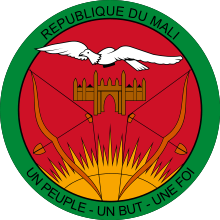Location
The Sudanese Republic and Senegal became independent of France in 1960 as the Mali Federation. When Senegal withdrew after only a few months, what formerly made up the Sudanese Republic was renamed Mali. Rule by dictatorship was brought to a close in 1991 by a military coup that ushered in a period of democratic rule. President Alpha KONARE won Mali's first two democratic presidential elections in 1992 and 1997. In keeping with Mali's two-term constitutional limit, he stepped down in 2002 and was succeeded by Amadou Toumani TOURE, who was elected to a second term in a 2007 election that was widely judged to be free and fair. Malian returnees from Libya in 2011 exacerbated tensions in northern Mali, and Tuareg ethnic militias rebelled in January 2012. Low- and mid-level soldiers, frustrated with the poor handling of the rebellion, overthrew TOURE on 22 March. Intensive mediation efforts led by the Economic Community of West African States (ECOWAS) returned power to a civilian administration in April with the appointment of Interim President Dioncounda TRAORE. The post-coup chaos led to rebels expelling the Malian military from the country's three northern regions and allowed Islamic militants to set up strongholds. Hundreds of thousands of northern Malians fled the violence to southern Mali and neighboring countries, exacerbating regional food shortages in host communities. An international military intervention to retake the three northern regions began in January 2013 and within a month most of the north had been retaken. In a democratic presidential election conducted in July and August of 2013, Ibrahim Boubacar KEITA was elected president. The Malian Government and northern armed groups signed an internationally-mediated peace accord in June 2015.
Mali is a semi-presidential republic.
Source: CIA World Factbook
Members:
Resources
Displaying 16 - 20 of 107Décret n° 2016-0297-P-RM du 6 mai 2016 fixant l’organisation et les modalités de fonctionnement de l’Observatoire national des Villes.
Le présent décret fixe l’organisation et les modalités de fonctionnement de l’Observatoire national des Villes (ONAV).
Arrêté n°2016-1675/MDEAF-SG du 31 mai 2016 fixant les attributions spécifiques des membres du secrétariat permanent de la reforme domaniale et foncière au Mali.
Le présent arrêté fixe les attributions spécifiques des membres du Secrétariat permanent de la reforme domaniale et foncière au Mali. Sous l’autorité du Secrétariat Général du Ministère des Domaines de l’Etat et des Affaires Foncières, le secrétaire permanent est chargé de programmer, de diriger et de coordonner l’exécution des missions assignées au secrétariat permanent de la reforme domaniale et foncière au Mali. Par ailleurs, ce texte détermine les attributions des membres du secrétariat permanent secrétaire permanent (le juriste, le géodésien informaticien et les experts).
Décret n° 2016-0298-P-RM du 6 mai 2016 fixant le cadre organique de l’Observatoire national des Villes.
Le présent décret fixe le cadre organique de l’Observatoire national des Villes.
Met en oeuvre: Décret n° 2016-0297-P-RM du 6 mai 2016 fixant l’organisation et les modalités de fonctionnement de l’Observatoire national des Villes. (2016-06-05)
Arrêté n° 2016-1022/MATP-SG du 29 avril 2016 fixant les attributions des membres du Secrétariat Général du Ministère de l’Aménagement du Territoire et de la Population.
Le présent arrêté fixe les attributions spécifiques des membres du Secrétariat Général du Ministère de l’Aménagement du Territoire et de la population.
Décret n° 2016-0272-P-RM du 29 avril 2016 fixant les modalités d’application de la Loi n° 2015-035 du 16 juillet 2015 portant organisation de la recherche, de l’exploitation et du transport des hydrocarbures.
Le présent décret définit les modalités d’application de la Loi n° 2015-035 du 16 juillet 2015 portant organisation de la recherche, de l’exploitation et du transport des hydrocarbures.


